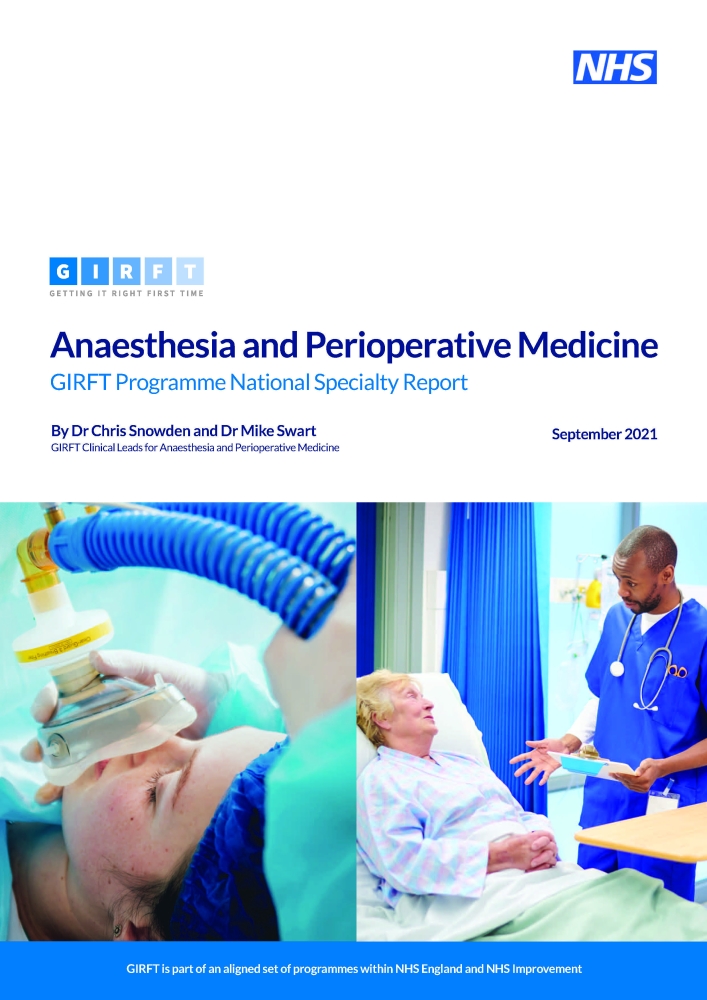‘Day surgery as the default’ is important key to tackling COVID-19 surgical backlog, says GIRFT report

Increasing the use of day surgery – fostering a culture where it is seen as the first choice for suitable patients – is a major solution to tackling the surgical backlog that has built up as a result of COVID-19.
The Getting It Right First Time (GIRFT) programme national report for anaesthesia and perioperative medicine, outlines measures which can help the NHS in England recover services while remaining ready to cope with any future surges.
With more than seven million NHS operations performed every year, increasing the number of patients who do not need an overnight stay in hospital can help to reduce waiting times as well as improving efficiency and offering cost savings of up to £2m for every trust*. This is especially important in the context of COVID-19, and the report outlines how day surgery can continue even when the hospital system is under increased pressure from emergency admissions.
The GIRFT review found that while day case rates have increased in recent years, there is still considerable variation between trusts (from 36% to 77% of all surgical admissions). The report is clear that perioperative and surgical teams should take responsibility for driving and delivering a culture of day case as the default option where suitable, and offers a number of practical measures towards achieving this.
The report has been written by GIRFT clinical leads Dr Chris Snowden (consultant anaesthetist at Newcastle upon Tyne Hospitals NHS Foundation Trust), and Dr Mike Swart (consultant in anaesthesia and critical care at Torbay and South Devon NHS Foundation Trust).
It highlights that the delivery of high-quality day surgery pathways is crucial to the recovery of surgical services, offering a safer environment for patients, and enabling the NHS to tackle expanding waiting lists and reduce the secondary impact of COVID-19, which is associated with delayed surgery.
Anaesthesia is the largest hospital specialty in England, involved in a third of all hospital admissions. While the anaesthetist’s skill in theatre is well established, they also have unique insight into the similarities and differences between surgical specialties, and that special insight lies at the heart of perioperative care – the patient-centred, multidisciplinary team-based approach to care of the patient, from the contemplation of surgery to discharge and beyond, to provide a seamless patient pathway and experience.
The 18 recommendations in the GIRFT report are relevant to clinicians across multiple specialties. as well as to NHS systems policy-makers as they seek to recover and improve services in the context of COVID-19. They include:
- Enhanced recovery pathways to ensure inpatients are discharged as early as possible: ‘Enhanced recovery’ is a pathway which prioritises patient preparation and participation in their own care, to enable them to recover more quickly following planned operations and allow early, safe discharge with minimal readmission rates. There is an urgent need to refocus attention onto these recovery pathways to ensure better outcomes for patients and reduce length of stay. The report advocates a team-wide approach to enhanced recovery involving nurses, doctors, anaesthetists, surgeons, dieticians, physiotherapists and everyone involved in the perioperative pathway.
- Integrating perioperative care across all surgical pathways: the use of perioperative medicine has been shown to reduce length of stay, complication rates, the use of intensive care and the overall cost of care. Trusts are recommended to establish multidisciplinary, multi-specialty teams to deliver perioperative care, while Integrated Care Systems (ICSs) and trusts should work together to ensure the standardisation of perioperative care through clinically-led networks.
- Reducing the number of cancelled operations through the use of enhanced care: ‘Enhanced care’ is a level of care above that offered by a standard acute ward but below that of critical care. Increasing the use of enhanced care can reduce demand on critical care beds, which can prevent on-the-day cancellations due to a lack of beds. It also offers more flexibility in emergency care. Staff who gained new skills working in critical care at the peaks of the COVID-19 pandemic can be utilised to work on enhanced care.
* NB: The report outlines an opportunity for cost efficiencies of between £263m and £398m a year (approximately £2m per trust in England). These figures are calculated on the basis of GIRFT APOM index procedures only or on a single pathway, when in fact the report’s proposals are wider-ranging and the potential savings could be greater. It should also be noted, however, that some of the financial opportunities outlined may overlap with others already identified in other GIRFT surgical national reports.

